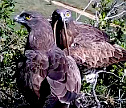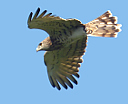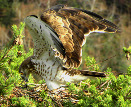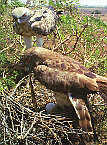 The next live broadcast of the same Short-toed Eagles’ nest in the Judean Foothills /map/ has been started by Guilad Friedemann and the team on April 4th. As in the two previous years, the stream can be watched on the Israeli Birding Portal. More details are available on the Israel Raptor Nest Cam Facebook page.
The next live broadcast of the same Short-toed Eagles’ nest in the Judean Foothills /map/ has been started by Guilad Friedemann and the team on April 4th. As in the two previous years, the stream can be watched on the Israeli Birding Portal. More details are available on the Israel Raptor Nest Cam Facebook page.
Posts tagged ‘behaviour’
Short-toed Eagles in Northern Ukraine, 2017 (part II)
Feb 28, 2018 / Comment The compilation of the annual gallery for 2017 has been finished. Photos taken in Northern Ukraine depict well-known and new individuals of the monitored pairs. Only 36 out of thousands of pictures taken with the main purpose to regularly identify local Short-toed Eagles individually have been selected for the represented gallery.
The compilation of the annual gallery for 2017 has been finished. Photos taken in Northern Ukraine depict well-known and new individuals of the monitored pairs. Only 36 out of thousands of pictures taken with the main purpose to regularly identify local Short-toed Eagles individually have been selected for the represented gallery.
An article on ST Eagle aggregations and dietary changes
Jan 30, 2018 / CommentThe represented article by Sameh Darawshi and others has been recently published in the latest issue of the Journal of Raptor Research:
• Sameh DARAWSHI, Yossi LESHEM and Uzi MOTRO, 2017 – Aggregations and Dietary Changes of Short-toed Snake-Eagles: A New Phenomenon Associated with Modern Agriculture // Journal of Raptor Research, Vol. 51 (4): pp. 446-450. (En).
Bernard Joubert’s article on communication of ST Eagles
Dec 10, 2017 / Comment The following paper by Bernard Joubert on Short-toed Snake Eagle communication abilities was recently published:
The following paper by Bernard Joubert on Short-toed Snake Eagle communication abilities was recently published:
• Bernard JOUBERT, 2017 – Circaète Jean-le-Blanc : des "mots" pour le dire [Short-toed Eagle: "words" to tell] // Rapaces de France, n° 19: pp. 54-55. –  (Fr) {rough translation}.
(Fr) {rough translation}.
The summary
Short-toed Snake Eagles have the rich social language, various tools which help them to express their intentions and relation to behaviour of other representatives of their species. The main problem of studying their behavioural language is defined by difficulties of correct interpretations. Besides various vocal signals, these eagles reveal a rich body language vocabulary, thanks to the extraordinary plasticity of their plumage, which is used for hovering in different airflows while hunting. Simplistically, 3 types of signals are identified: those related to movements, postures and holding of plumage.
› Examples of the gestural communication are: aggressive demonstratively slow and strong wing-beats, so-called «vulture» flights, territorial «festoon» display flights.
› Communicating through postures includes: an aggressive «albatross» posture, a posture of «angel» which is used for marking a chosen nest for the partner.
› Communicating through appearance changes at close contacts comprises states of occipital feathers and pupil size, which can express both tension and relaxation of birds.
This brief review is nothing more than an invitation to observe and puzzle out those various and subtle means of ST Eagles’ communication.
Short-toed Eagle breeding biology in NW India
Aug 31, 2017 / Comment An article about breeding of Short-toed Eagles in Surendranagar District /map/ has been published in the Indian BIRDS – Journal of South Asian Ornithology this year. Such releases are always of great interest because observation data on Indian Short-toed Eagles are rarely available on the Web:
An article about breeding of Short-toed Eagles in Surendranagar District /map/ has been published in the Indian BIRDS – Journal of South Asian Ornithology this year. Such releases are always of great interest because observation data on Indian Short-toed Eagles are rarely available on the Web:
• Devvratsinh MORI, Raju VYAS & Kartik UPADHYAY, 2017 – Breeding biology of the Short-toed Snake Eagle Circaetus gallicus // Indian BIRDS. Vol. 12, No. 6: pp. 149-156. –  (En).
(En).
Photos of Short-toed Eagles in Northern Ukraine in 2017
Jun 30, 2017 / Comment Compiling of the next annual gallery has been started, the gallery of photos taken in different regions of Northern Ukraine this year. Each Short-toed Eagle identified individually is indicated, as always, in captions by a letter and a year of the first representation in photo galleries on the site. The collection will be updated after the season.
Compiling of the next annual gallery has been started, the gallery of photos taken in different regions of Northern Ukraine this year. Each Short-toed Eagle identified individually is indicated, as always, in captions by a letter and a year of the first representation in photo galleries on the site. The collection will be updated after the season.
La Plume du Circaète n° 13-14-15
Apr 30, 2017 / CommentThis issue of La Plume du Circaète –  (Fr) {rough translation} contains materials of the 4th meeting of the Short-toed Snake Eagle French national network, conducted in Roquefixade (Ariège) on October 8-9, 2016. The list of contents (En):
(Fr) {rough translation} contains materials of the 4th meeting of the Short-toed Snake Eagle French national network, conducted in Roquefixade (Ariège) on October 8-9, 2016. The list of contents (En):
Many thanks to Bernard Joubert, Jean-Pierre Malafosse, Manon Munoz, Renaud Nadal and all the authors of the bulletin for sharing knowledge!
